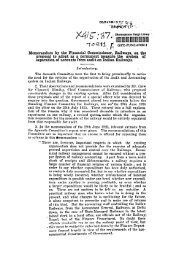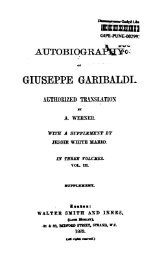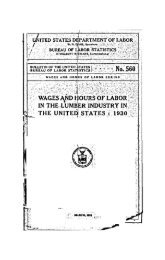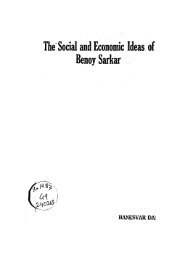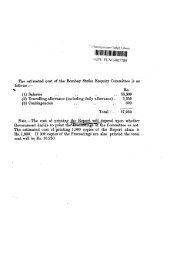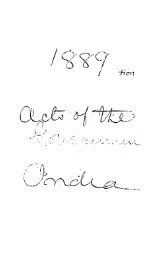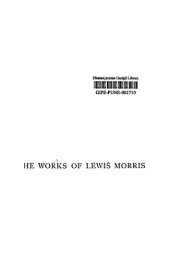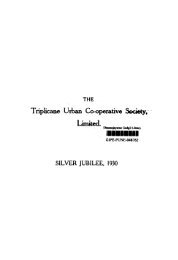You also want an ePaper? Increase the reach of your titles
YUMPU automatically turns print PDFs into web optimized ePapers that Google loves.
December 4th, 1925 INDIAN OPINION 3 1 5<br />
---- - - ----- --~-----.,-----=....:..:....:....::,-=--------.:!.:.::!.-<br />
thod'l of a~taining Hwaraj and followed it up with<br />
an a Hl'f'sS on • Culture an.l Public Life' by the<br />
IIon'ble Sir C, P. I{,lml-iwdmi Iyer, L'1w Member of<br />
the G()VCrnmClnt of Ma lrdl!. Mr. BhuLlbhai J.<br />
DC8a: pre~i'l(Jd. Thp- chOice of the Chairman W.1S<br />
apprOpll,\t'> to th" OCI: IIH()'l. )'lr. Dasai wail an<br />
aI")f'nt Homo-rill,'" in the days of the home-rule<br />
a~itatlOll of Df' H'~lnt'!4 br,m,l. So Wil.'! Sir (then<br />
Mr.) Rollna'lW,lml lyer. The Chairman lell Rombay<br />
while the IpGtllrer led Ma.lra!!. Both are IJ.wyers,<br />
and eminent in their c,lhn~. Both are young. The<br />
chairman, If Dame Rllrnf)Ur spoke truly, wooed the<br />
LIW Mflmbcl'lIhip of the Guv('rnmf'nt of India, or<br />
was woood in tlllt b,.h,lf, whlle the lecturer WJ.S<br />
led captive into the Law ~Iembert4hip of the Madras<br />
Government by Lorll and Vvly Willingdon. Nonco-operatlOn<br />
drove both the chairman and lecturer<br />
out of poht\C~ by its int()lol\mC..l of oPPQsite viewil,<br />
-one into tho arms of the proft'saion and the other<br />
other into an olllbrance of th,., burP-aucracy. It. was<br />
thercfOl"e only to be expect",l that when an attractive<br />
subject as 'culture an. I pnblic life' WJ.S proposed,<br />
the lecturer Bhould make it a pea for a sermon and<br />
an apology. If non-co-operatIOn had not produce!!<br />
intolerance, wf'll,-thc lecturer may not have left<br />
public life. Wh,lt wa::! puhlic liCe without tolerance?<br />
Cultivate toleJ"lnce bofore all other virtues. That<br />
was the burden of the lectmer, although he omitted<br />
all references to non-co-operatIon.<br />
Pros<br />
The address was excellent in its dIction, elegance<br />
and imagery. Sir Rtmaswami is a cultured man in<br />
the sense that he is a mll'l of accomplhhmentil. His<br />
desertian of politics had. not lost him the cunning of<br />
speech. Hlr R.Lma3wami referred to religious persecutions<br />
ill IIindu religious history which are relics<br />
of a barbarous age and to tolerance that has sinoe<br />
markcd the spiritual growth of this ancient land<br />
whieh is rightly acclaimt'tl the 'cradle of religions-'<br />
lIe quoted eminent men of lettprs who rightly 'laid<br />
emphasis on the neell for htlDllhty and tolerance ail<br />
inalienable characteristics of culture. Sir Ramaswami<br />
also referred to the dogmatism of the journalists<br />
tending to give a fundamental aspect to the immelhate<br />
and evanasccnt. In conclusion, the lecturer<br />
plelldell not for the extinction of aU dogmatism<br />
bllt for the co-existence of a respect for the opposite<br />
view point. l\h', Desai endorsed, the appeal of the<br />
lecturer and asked the youth to learn to win without<br />
conct'lt and loso Without rancour. lIe claimed that<br />
Bombay was f.lst re-establillhing its claim to be a<br />
city With a large fund of tolerance and as~ured the<br />
lecturer that he would always bo welcome, whatever<br />
views ho held or may have ceased to hold since the<br />
Home-mil' days. The last repartee was a doubleedged<br />
weapon in this casE', as Mr, Desai is equally in<br />
Sil' Ramaswami's plight. The audience, however,<br />
was not critlCal and MI'. Des,\i eilcaped.<br />
Cons<br />
It is but fair that tho other side of the case should<br />
be stated. Advocates of tolerance do concede that<br />
there is room for a lImlted amount of dogmatism, as<br />
all Rections C.lU inill.Lte only from a positivity of convlCtion<br />
that one side of the C,LSe is for the time being<br />
the right viewpoint. Tho recognition conceded to<br />
dogmatism is however nominal. The emphasi~ of<br />
tolerance is real. What the advocates of tolerance<br />
have In mind is the intolerance of the non-co-operation<br />
days. Now that non-co-operation has failed.<br />
its critics are able to s.L1 "we told you so." But let<br />
us eraase from our mind the failure of the non-co-_<br />
opel'ation movement and only remember the intensity<br />
of national feeling during the p:limy dayS of<br />
non-eo-operation. The country was ilgething with<br />
feelin!,'S of anger an,l illthgnation. The Punjab and<br />
Khilafat wronllS wt'l'1.cnough to try the patieuce of<br />
pn, ,nlbJeo\ people. 4"ldW tn " orlU(!M etatt Uk. thatt<br />
)'" Gandbi rlRbU, Cll' wrCl!1li11, of!81'eQ a proRra!UD111<br />
of action which caught popular fancy. Many calculated<br />
mind. laW the seeds of failure in the movement<br />
and iltood aloof and they had to bear the<br />
opprobrium of their aloofness. It hall been argued<br />
that if BO one had stood aloof non-co-operation<br />
wonld have encceeded. It is an argument that does<br />
not compellJympathy. If non-co-operation did not<br />
appeal to the reason of a section of people they had<br />
every ri,;-ht to refrain from participation and even to<br />
attack it. The i88uI for consideration, howevet, is<br />
whether the exe&I!I!IM of the people in the heat of<br />
non-co-operation which resulted in the temporary<br />
ecliplJe of anti-non-co-operationists, were really of<br />
8nch a character lUI Tiuted the atmosphere of public<br />
lite.<br />
Dadabhai N aoroji<br />
A Reminiscence<br />
By RT. HON'BLJI V. S. SRINlVASA SASTRI, P. C.<br />
Twiee I wae privilf'ged to meet Dadabhai Naoroji.<br />
The first oCOOllion Wall in the very end of 1906, after<br />
he had presided over the famous Congress of that<br />
year and for the first time used the fatefnl word<br />
.. Swaraj." Gokhale had arranged that the yonng<br />
men who had joined the Servants of India Society<br />
or were about to join it ihould wait on the Nester<br />
of Indian Nationalism and receive his blessing on<br />
their life-mission. I had not been sworn, but I had<br />
resigned from my profell8ion and come to Calcutta<br />
to be admitted in form to the Society. Mr. C. Y.<br />
Chintamani too wal there, for then he contemplated<br />
joining the Society. Mr. (now Sir) Dinshaw Wacha<br />
was the only stranger present. We were introduced<br />
in a few words by Gokhale, whose behavionr on the<br />
occasion I remember as a pattern or reverence or<br />
self-respect in Ratural and attractive combination.<br />
The GM\nd Old Man gave us impressive advice. One<br />
interesting IJtatement is perhaps worthy of being recorded.<br />
He had himself contemplated the formation<br />
of a body of workers eimilar to the Servants of<br />
India Society and congratulated Gokhale on his<br />
good luck in realilling that which to him had only<br />
been a dream.<br />
The other time was in 1IHO. The Society had<br />
held a bnsy and frnitfnlsession. We had resolved<br />
to open branches in Bombay and Madras, and to<br />
enable me to llSSume command of the Madras<br />
Branah, my training had been as a special measure<br />
terminated at the end of three years and a half, and<br />
I had been declared Ordinary Member. The Madras<br />
contingent left Poona like men adventuring forth<br />
on a rlaring enterpriiJe and resolved to fortify themselTes<br />
at the start by a draught of inspiration at the<br />
very fonntain of patriotism. So we went by previous<br />
appointment to Versova, where Dctdabhai was<br />
surrounded by the loving care of his family. We<br />
were seated in a small ~oom and promised not to tire<br />
the venerable patriarch. He entered in full dress<br />
and occupied a large chair. I broken the silence by<br />
a short speech explaining our presence and praying<br />
for just one word of collnsel an~ encouragemenL<br />
He Mid a few words in reply by which we felt<br />
more than rewarded. A conversation ensued, in<br />
which he showed solicitude for onr comfort and<br />
satisfied himself that arrangem,ents had been made<br />
for dne hospitality to us. We also succeeded i~<br />
pertiuading him that his yaluable library should bjf<br />
left as a legacy to our Society, wher~ we had already<br />
a r~peQtable collection of books on politics, hi8tory<br />
and euonomtoa and o~ I'arliaDlentart .t'e90t'd. Be<br />
ll#J1ttaUt pve fn,mzatidU' far the ... maw 01 Us,



